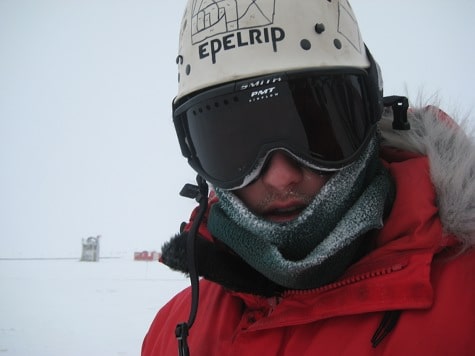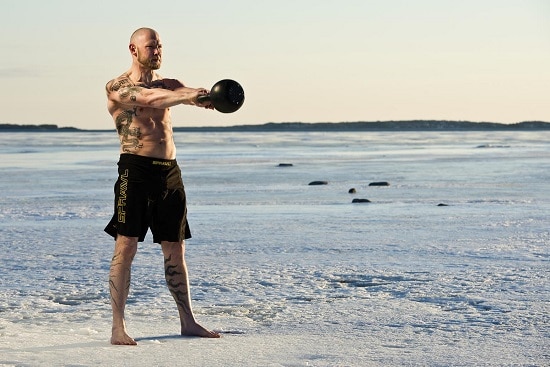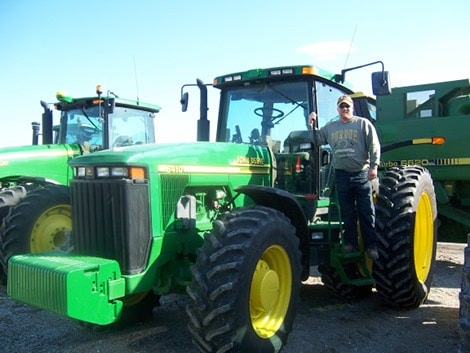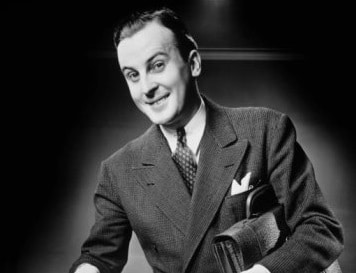
Once again we return to our So You Want My Job series, in which we interview men who are employed in desirable jobs and ask them about the reality of their work and for advice on how men can live their dream.
Are you a guy who loves athletics, working out, and learning about health and fitness? Did you always dream of playing professional sports, but weren’t blessed with the talent or body to compete at the highest levels? While you may not be able to play yourself, you do have a shot at becoming the guy who trains those world class athletes. Of course, as Shawn Windle, strength and conditioning coach for the Indiana Pacers explains, that shot is nearly as slim as being drafted by the NBA: this is an incredibly competitive career path. Do you have what it takes? Read on.
1. Tell us a little about yourself (Where are you from? How old are you? Describe your job and how long you’ve been at it, etc).
I am a 38 year old strength & conditioning coach for the Indiana Pacers, which for those of you that do not know, means I am responsible for the building and rebuilding of NBA bodies. I am responsible for the performance of nearly 60 million dollars of annual assets. My duties include the design and implementation of programs to improve strength, speed/agility, power, nutrition, recuperation, and rehabilitation.
I was born and raised in Auburn, Maine or as my friends like call it, Southern Canada. While building my resume, my wife and I have lived in Florida (Lehigh Senior High School), Massachusetts (Auburn High School), New York (Minor League Baseball), Connecticut (University of Connecticut), New Jersey (Rutgers University) and now here in Indiana. My career is at 15 years and counting, 6 of which have been with the Pacers.
2. Why did you want to become a strength coach? When did you know it was what you wanted to do?
I really stumbled upon this career path. I bounced around to a few colleges trying to find what was right for me, even being told by one to not return. It took being asked by a boss at a pool store to clean the floor with a handheld brush that was about eight inches long for the light bulb to really go off for me, and I decided that if I did not go back to college, scrubbing floors would be my lifelong vocation.
I began taking courses to improve my grade point average so that I could get back into college as a full-time student. I really enjoyed lifting weights in the typical meathead sort of way, and I loved athletics, so when I went on a college visit to the University of Maine at Presque Isle and the athletic training program director mentioned Strength & Conditioning as a related field, I was hooked. In my first class back in college (History of Physical Education) I listed being the head strength coach of an Olympic Team as my career goal. Although I have trained Olympic athletes, I have not been a strength coach for an Olympic team. Which is okay…the government doesn’t pay as well as the NBA. LOL!
3. If a man wants to become a strength coach how should he prepare? Should he go to college, and if so, what should he major in?
Although nearly anybody can be a personal trainer and there are many courses online to do so, to be a strength & conditioning coach, a 4 year college degree is the first step. Not all strength coaches have degrees in kinesiology, athletic training, or exercise science, but most do, and having a degree in one of those areas will help your chances of getting hired. There are numerous certifications that are either mandatory or highly recommended. The National Strength & Conditioning Association is one of the most prominent entry-level requirements to becoming a Certified Strength & Conditioning Specialist. The College Strength & Conditioning Coaches Association offers a certification process that is steadily gaining in popularity. Once those “baseline” requirements are met, there are numerous parallel certifications that employers look for. For example in addition to the NSCA certification, I am also certified by the National Academy of Sports Medicine as a Performance Enhancement Specialist and also as a Corrective Exercise Specialist, a USA Weightlifting Level One Club Coach, Certified Athletic Trainer by the National Athletic Trainers Association, Certified in CPR and AED, and finally in the Functional Movement Screen. Each certification obviously adds to your toolbox of knowledge but also improves your likelihood of landing a job. Many strength coaches also attend graduate school to seek a master’s degree since some jobs strongly encourage applicants to have an advanced degree. Coursework includes a heavy dose of science, and if that scares you, take a deep breath. I did not enjoy or do well at biology or chemistry because they seemed very abstract to me considering my career goals; however, when it came to exercise science, kinesiology, and motor learning, I found the movement sciences much more interesting and actually easier because I knew those courses would directly affect my future.
4. Once you have the necessary skills, how do you go about getting your foot in the door and landing your first job? How do you go from the bottom of the ladder to becoming a strength coach for a professional sports team?
Volunteering!!! Nobody wants to hear it, but you must be willing to work for free. I was fortunate in that I have received at least some form of payment throughout my career, but I know plenty of people that are professional interns. Jobs working with athletes are hard to find, jobs working with really good athletes are really hard to find, and working with elite athletes is nearly impossible. Many young coaches build their resumes by interning with well known strength coaches at well known universities to increase their visibility and to prove that they are capable of handling the stress of working in a pressure cooker. We have seen the stakes grow each year in college sports, and new coaches usually have 4-5 years to make a significant impact in the win column (2-3 years in professional sports); therefore, the will to win and prepare to win are extremely high on the priority list. Losses can be very tense times for everybody involved from the head coach all the way down to the interns. Higher profile jobs generally lead to other high profile jobs. A great deal of effort, determination, networking, and preparation help move you through the field just like any other profession. Most strength coaches I know have moved around the country quite a bit with the intention of building their resumes and sometimes because they are forced to move. If you are a strength coach in the NFL, you could have a short shelf life since many are directly linked to the head football coach. When that coach gets fired, many times the strength & conditioning staff is released as well. The ideal situation is to be hired by the owner or general manager since these positions do not experience as much turnover.
5. How competitive is it to land a job as a strength coach at the top levels? What separates a candidate for a job from the other guys?
The numbers are stacked against you if you think you are going to fast track to professional sports. If my memory serves me right, there are over 20,000 members in the National Strength and Conditioning Association and last time I checked there are only 30 NBA teams and about the same in the NFL, NHL and MLB respectively. Do the math! My profession is like any other profession in the sense that you have some people in my position because they are the owner’s cousin, and you have some great strength coaches, and some down right head scratching bad ones. I think most things function on the bell curve, and I would say most professions follow that distribution from terrible to great. I feel like I prepared myself through education, certifications, and practical experience while meeting the right people along the way. Everything in life comes down to your relationships with people. I have seen a lot of great strength coaches never advance in their career because they didn’t understand relationships or refused to play a game that they felt involved too much ass kissing. If meeting people, being nice to them, and working hard is called ass kissing, then I puckered up long ago. If you treat people with respect and show a genuine interest in them, I call that being a man.

6. What is the best part of your job?
I wear shorts to work! Enough said! Seriously that is one of the many perks. If you like shorts, sneakers, socks, sweat suits, or virtually any athletic apparel, the NBA is for you. I have more “gear” than I know what to do with, and it is hard to pass it on to family and friends because at 6’ 6” and 250 pounds it is pretty hard to find people that wear my size. If you are a basketball junkie, you have a courtside seat to the best basketball players in the world for an 82 game regular season schedule. We travel on chartered planes that have outlets for our electronics (everybody is attached to something whether it’s an ipad or a laptop), and first class seating throughout the plane. In my position, I have had some great opportunities to go to concerts in suites, the Indy 500 in a suite and have met countless celebrities/athletes/actors. We stay in the top hotels in the country and every time you turn around there is food. Remember the freshman 15? Watch a rookie staff member relive his freshman year. It takes a lot of discipline to lay off all the food, and it can easily get out of hand.
Outside of the peripheral perks of the job, you also get to be part of a team. Not a cliché team, but an actual group of men working toward ONE goal. Living in close proximity of one another. It is a bond that many people will never grasp. Being a part of the process and helping each player reach his potential can be very rewarding. I see my role as a strength coach as more than just telling them to lift weights. These are pretty young guys and many do not have strong guidance. They have never been asked to grow up, so I like to talk to them about the importance of developing a daily routine and leadership. Great teams understand that none of what we do is really about basketball. It is about developing men. When you teach respect, discipline, accountability, and hard work, everything else falls into place.
7. What is the worst part of your job?
People see the lights and the glamour of the NBA, but what people don’t stop and consider is what we do when the final buzzer sounds. If we are on the road, we usually spend an hour in the locker room while media comes in and guys shower before we even leave the arena. Most games start at 7 pm and end at about 9:30 pm, meaning that we start making our way to the airport at 10:30 pm. The average time in most cities is 20 minutes to the airport, then add in another 30 minutes for the bags to get loaded and get airborne. Usually we get in the air about 11:30 pm if all goes according to plan. Sometimes things don’t run so smoothly like overtime, post game x-rays, stitches, the bus breaks down (oh yes I have seen it), and don’t forget we play mostly in the winter and that means de-icing which can add 20-45 minutes to our departure time. If we are going home, we get to sleep in our own beds, and those of us with kids can expect an early wake up call, so there are plenty of nights I get 3, maybe 4 hours of sleep because when my kids know that Daddy is home from a trip, they usually come in and jump on me bright and early. Sometimes we are on the road, and we get into a city like Denver at 3:00 am, unload the plane, and take the longest ride in the NBA to get downtown. The job can be physically and mentally draining. During the fall the only way we know what day it is depends on if we are watching college football, NFL football, or Monday Night Football. I also always know when it is Thursday because that is trash day at home.
I paint a bad picture, but those are some of the realities of working in the NBA. It is certainly not for everyone.
8. What’s the work/family/life balance like?
With all the travel and home games included I missed 110 dinners and bedtimes at home, causing my wife to function as a single parent from October until April. When I am in my house my phone stays on vibrate, and I only check it a couple of times during the night, only responding to emergencies. I want my kids to have my undivided attention since we have so little time together during the season. That means my wife gets whatever is left over and most times we are so exhausted at the end of the day that leaves our free time to be spent side by side, sound asleep. Family balance does not exist during the season. You do the best you can to make amends during the summer since we don’t work as many hours, and we get to sleep in our own bed almost every night.
9. What is the biggest misconception people have about your job?
I have heard a lot of people tell me that they would not want to deal with overpaid prima donnas all day long. Dealing with rich young men that don’t want to work. In six years I have really only worked with a couple of divas; the majority of the players are appreciative of everybody on staff and understand that each staff member is there to help them succeed. These guys did not make it to the NBA by simply being tall, and although that helps, it takes countless hours in a gym while nobody else is around working on their skills. Nobody sees these guys come to the arena 3-4 hours before a game. Or come back after the game when the crowd is gone to shoot extra shots. Of course not everybody works like this, but isn’t that why coaches have jobs? I view myself as more of a teacher than anything.
10. Any other advice, tips, commentary or anecdotes you’d like to share?
As a side note, this interview took me almost four weeks to complete. During that time I have visited current players in New York, Los Angeles (twice), and North Carolina in addition to helping with the draft process where we have injected, inspected, and detected nearly 50 draft eligible draft prospects in Indiana alone not to mention a week spent at the NBA Pre Draft Camp in Chicago where the evaluation process includes height, weight, wingspan, body fat, upper body strength, lower body power, speed, and agility. Welcome to the OFF-Season where you spend time with your family!
Tags: So You Want My Job







